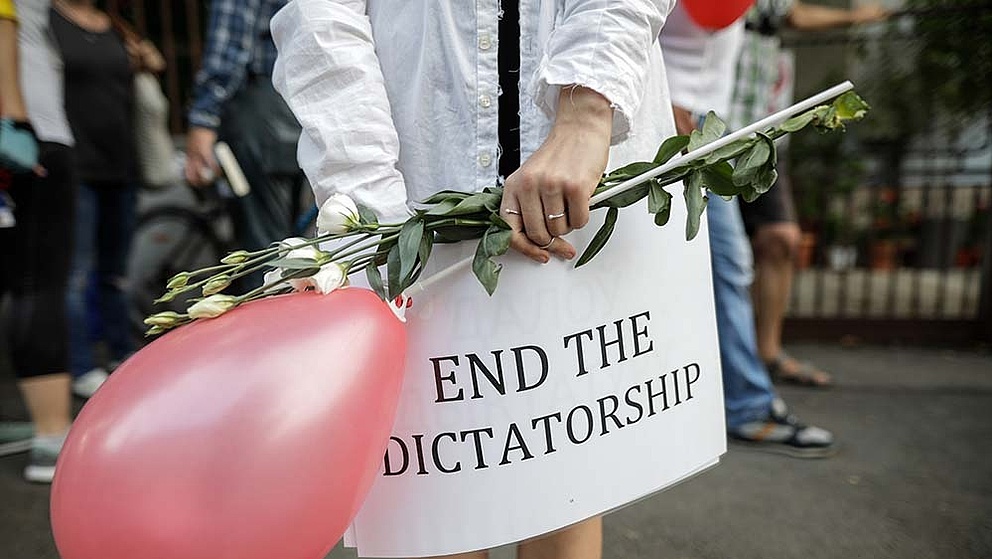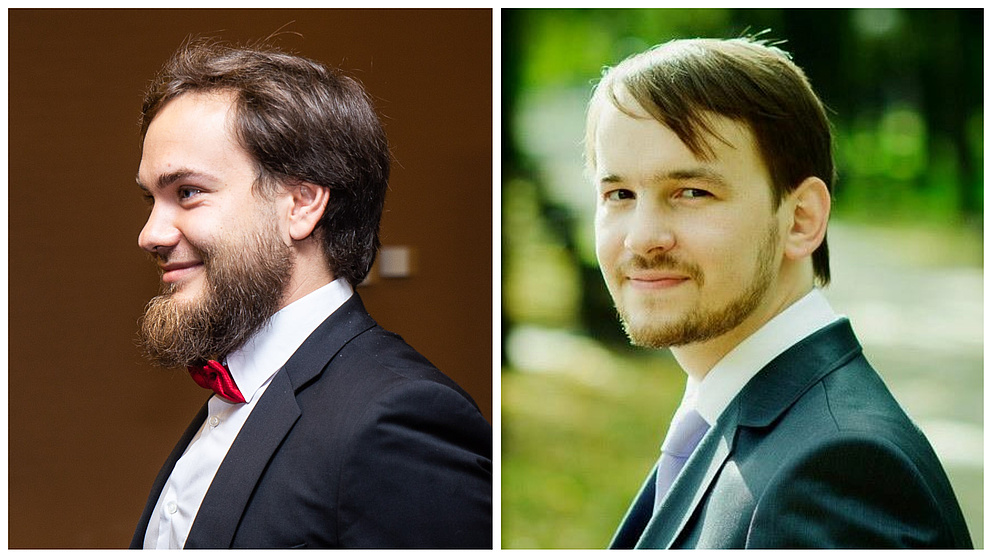

Contact
Press, Communications and Marketing
Tel.: +49 228 833-144
Fax: +49 228 833-441
presse[at]avh.de
Since the beginning of the protest movement following the controversial presidential elections in August 2020, students and researchers in particular have suffered repression under the regime of Alexander Lukashenko. Together with his fellow sociologist Vasil Navumau, Ilya Sulzhytskiy is one of the first fellows from Belarus able to continue his research in exile in Germany on the strength of the Philipp Schwartz Initiative. Here the two researchers report on how their compatriots are faring as well as on the importance of support from abroad and science diplomacy. The future of their country is at stake:
Humboldt Foundation: Mr Sulzhytski, what did you experience in Belarus?
One thing I’d like to emphasise: What I experienced in autumn 2020 was nothing in comparison with what is going on today. Today, a judgemental glance at a policeman or a post on social media are enough to get you arrested. Back then, after the presidential elections, I was put under pressure by the university administration, constantly vetted, reprimanded for trifles – all just harassment. And my students were interrogated by the Committee for State Security about me and other members of the Strike Committee. I started to get seriously worried when the first colleagues were taken in for questioning. It was impossible for me to stay at the university; I was refused promotion to an assistant professorship although I fulfilled all the requirements.
How did you react?
Ilya Sulzhytski: The university tried to force “disloyal” staff to leave the uni “at their own request”. It was normal practice at the time because those affected could no longer prove that they were being fired for political reasons, which made it difficult for them to appeal to aid programmes like the Philipp Schwartz Initiative or the Polish Konstanty Kalinowski Scholarship Programme. I knew I wouldn't get my contract renewed because I was blacklisted. So I left the country because I was worried about my parents, and working at the university under constant pressure became impossible. A transition scholarship in Poland made it all possible.
Mr Navumau, Why did you leave Belarus? What were your reasons?
I was alarmed when my colleague Stas Gorelik, a political scientist, was arrested in August 2020. We work on similar topics. It was clear that it could happen to anyone at any time. A number of staff and students were arrested, such as the law student Ekaterina Vinnikova. At a graduation ceremony, she had expressed her solidarity with two professors who had been fired. Academics are criminalised and accused of inciting public rebellion. I was able to go to Lithuania, had contacts in Bochum and Bremen; my family got visas for Germany. Thanks to the support of the Philipp Schwartz Initiative, I can work in Bochum on how populism in the communication of the opposition movement differs from the populism of the regime, and how it came about.

In response to the EU’s economic sanctions after a passenger plane was forced to land in Minsk, both the DAAD and the Goethe Institute in the Belarussian capital had to shut their doors. What does this mean for Belarussian society and academic freedom?
Vasil Navumau: That is a very unfortunate development. Lukashenko is forcing the country into greater isolation. His rejection of the West has grown ever stronger over the years. He wants to prohibit any kind of contact. And that although the DAAD and Goethe Institute did such important work which was especially significant for us lecturers. We could listen to lectures there, were invited on lecture trips abroad; it was the only opportunity to breathe “fresh air”, to feel another breeze in our hair.
Ilya Sulzhytski: It has to be said very clearly: scientific freedom is dead in Belarus! The country is effectively under occupation. The regime has declared war on dissidents and everyone who supports them. And it’s only the fact that we live in centre of Europe that stops the regime from setting up camps or reviving other terrible repressive measures from the 20th century.
The EU has imposed sanctions on Belarus. What can the West still do to support Belarussian dissidents and civil society?
Vasil Navumau: It’s incredibly important that there are fellowship programmes like the Philipp Schwartz Initiative and others and that they are expanded so that academics can continue their research and bridge this period.
Ilya Sulzhytski: I absolutely agree. Many colleagues need help to find places in European countries. That’s extremely important and an investment in the future. Because there will come a time after Lukashenko, and then the progressive Belarussian academics in exile will ensure that Belarus doesn’t find itself on the periphery of the civilised world but can get academia back on its feet again. There is no official way of helping colleagues in Belarus via the universities. All the bonuses of official cooperation with Europe go to people who are loyal to the regime and who participate in the repression of the academic community.
What about the researchers who have been fired? What can be done to combat their isolation?
Ilya Sulzhytski: The German Association for East European Studies has found wonderful ways of supporting dissidents. For example, they offer courses on how you can design and implement your own online seminars. I think it’s necessary to build networks amongst German researchers and the academic resistance in Belarus, which would have to be done anonymously. We would need a platform where academics from the Belarussian underground could post their CVs and make contact with mentors at German research institutions. With the aid of programmes like the Philipp Schwartz Initiative, for example, many would leave the country, but there are not enough mentors in Germany.
How do you see the future of Belarus?
Ilya Sulzhytski: I try to be optimistic, but people like the Belarussian publicist, Artem Schreibman, fear that Belarus could become a sanctioned, enclosed territory completely dependent on Russia, like the Crimea or Abkhazia. I share his fears. So, the question is, what will it cost Belarussians to get rid of Lukashenko.
Vasil Navumau: I’m actually quite optimistic. Given EU sanctions, Lukashenko may just be able to survive another six months, I reckon. And even Russia will think carefully whether it officially wants to show solidarity with a dictator. But it is very important to keep in contact and give people moral support.
